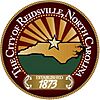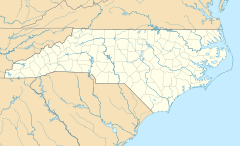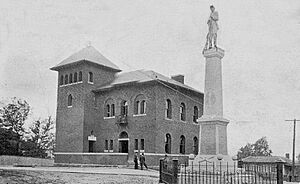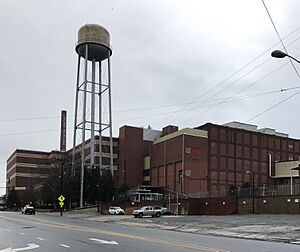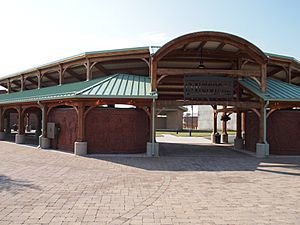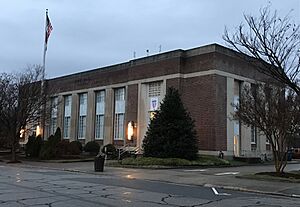Reidsville, North Carolina facts for kids
Quick facts for kids
Reidsville, North Carolina
|
||
|---|---|---|
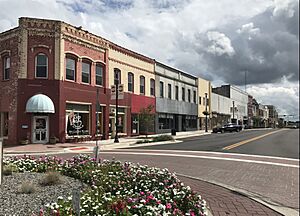
South Scales Street
|
||
|
||
| Motto(s):
"Live Simply. Think Big."
|
||
| Country | United States | |
| State | North Carolina | |
| County | Rockingham | |
| Area | ||
| • Total | 16.25 sq mi (42.09 km2) | |
| • Land | 14.81 sq mi (38.36 km2) | |
| • Water | 1.44 sq mi (3.73 km2) | |
| Elevation | 732 ft (223 m) | |
| Population
(2020)
|
||
| • Total | 14,583 | |
| • Density | 984.61/sq mi (380.16/km2) | |
| Time zone | UTC−5 (Eastern (EST)) | |
| • Summer (DST) | UTC−4 (EDT) | |
| ZIP codes |
27320, 27323
|
|
| Area code(s) | 336 | |
| FIPS code | 37-55900 | |
| GNIS feature ID | 2404605 | |
Reidsville is a city located in Rockingham County, in the state of North Carolina, United States. In 2020, about 14,583 people lived there. Reidsville is part of the larger Greensboro–High Point Metropolitan Area.
The city began in the early 1800s. It was a small stop along a stagecoach route. This route connected Salisbury, North Carolina, and Danville, Virginia. The area was first known as Wright's Crossroads. It grew from a single home and inn owned by Reuben Reid's family. Reuben Reid was a local farmer and businessman. His son, David S. Reid, later became a governor.
Reidsville became a busy farming town. It was especially known for growing tobacco and making cigarettes. The state government officially made Reidsville a city in 1873. It became a very important place for the American Tobacco Company. This company hired many people from the city and county. The American Tobacco Company was the main employer in Reidsville until it closed in 1994.
Many textile mills also opened in Reidsville. Companies like Cone Mills and Burlington Industries took over most of them. However, most of these mills have also closed now. Even though Reidsville has faced tough economic times, it is growing again. It is now seen as a "sleeper city" that helps with rural development for bigger cities nearby.
Contents
History of Reidsville
The story of Reidsville started in the early 1800s. A man named William Wright owned a tavern and store. This outpost was called Wright's Crossroads. It was the first settlement in what is now Reidsville. William's son, Nathan, and then his son-in-law, Robert Payne Richardson, managed it.
Richardson built his home in 1842. It was on a hill overlooking Little Troublesome Creek. This house is still standing today on Richardson Drive. It is the oldest house in the city.
How Reidsville Got Its Name
In May 1814, Reuben Reid moved his family to a farm. The farm was about 700 acres (2.8 km²) big. Reuben Reid was a successful farmer. He also ran a store and an inn. He served as a justice of the peace for the county.
In 1829, the family got a post office. They named it Reidsville. Reuben's 16-year-old son, David Reid, became the first postmaster. David Reid later became a State Senator. He also served as a U.S. Congressman and Governor of North Carolina. He even became a U.S. Senator.
In 1858, William Lindsey bought a large piece of land called Reidsville. He and his wife, Sarah Holderby, moved into the first frame house in the village. Reuben Reid had built this house across from his store.
Industry and Growth
Reidsville is in the eastern part of Rockingham County. The Southern Railroad runs through the city. However, the train station has not been used since 1988. The state government officially made Reidsville a city in 1873.
Tobacco was very important to the local economy for many years. The city's history is closely tied to the American Tobacco Company. When the company was sold in 1994, city leaders worked to bring in new types of businesses. The Reidsville Chamber of Commerce helps local businesses. It was started in 1923 and is now located downtown.
Several historic places in Reidsville are listed on the National Register of Historic Places. These include the Chinqua-Penn Plantation and the Gov. David S. Reid House.
Geography and Downtown Reidsville
Reidsville covers about 14.9 square miles (38.6 km²). Most of this area, about 13.4 square miles (34.7 km²), is land. The rest, about 1.5 square miles (3.9 km²), is water. This means about 10% of the city's total area is water.
Revitalizing Downtown Reidsville
Like many other cities, Reidsville's downtown area saw fewer businesses in the 1970s. This happened because new malls and shopping centers opened. To help the downtown area, the Reidsville Downtown Corporation was created in 1976. This group works to bring new life to the downtown.
The Downtown Corporation and the City of Reidsville have worked together on projects. These include the Main Street Program and the Streetscape Program. They also have a Façade Incentive Grant program. These programs help to make the downtown area look better and attract more businesses.
Population and People
| Historical population | |||
|---|---|---|---|
| Census | Pop. | %± | |
| 1880 | 1,316 | — | |
| 1890 | 2,969 | 125.6% | |
| 1900 | 3,262 | 9.9% | |
| 1910 | 4,828 | 48.0% | |
| 1920 | 5,333 | 10.5% | |
| 1930 | 6,851 | 28.5% | |
| 1940 | 10,387 | 51.6% | |
| 1950 | 11,708 | 12.7% | |
| 1960 | 14,267 | 21.9% | |
| 1970 | 13,636 | −4.4% | |
| 1980 | 12,492 | −8.4% | |
| 1990 | 12,183 | −2.5% | |
| 2000 | 14,485 | 18.9% | |
| 2010 | 14,520 | 0.2% | |
| 2020 | 14,583 | 0.4% | |
| 2022 (est.) | 14,566 | 0.3% | |
| U.S. Decennial Census | |||
Who Lives in Reidsville?
| Race | Number | Percentage |
|---|---|---|
| White (non-Hispanic) | 6,968 | 47.78% |
| Black or African American (non-Hispanic) | 5,858 | 40.17% |
| Native American | 36 | 0.25% |
| Asian | 90 | 0.62% |
| Pacific Islander | 13 | 0.09% |
| Other/Mixed | 592 | 4.06% |
| Hispanic or Latino | 1,026 | 7.04% |
In 2020, there were 14,583 people living in Reidsville. There were 6,166 households and 3,565 families.
In 2010, the city had 14,520 people. About 57% of the people were White. About 39.5% were African American. Other groups made up smaller parts of the population. About 2.6% of the people were Hispanic or Latino.
About 27.5% of households had children under 18. About 42.7% were married couples. The average household had 2.34 people. The average family had 2.92 people.
About 23.4% of the population was under 18 years old. About 18.8% were 65 years or older. The average age in the city was 40 years.
Famous People from Reidsville
Many notable people have come from Reidsville. These include athletes, musicians, and politicians.
- Scott Bankhead – A baseball pitcher who played in Major League Baseball (MLB). He also played in the 1984 Summer Olympics.
- Na Brown – An NFL wide receiver.
- Nelson Cole – A North Carolina State Representative.
- Max Drake – A musician.
- Jim Duncan – An NFL defensive end and coach.
- Mike Goodes – A professional golfer on the PGA Tour Champions.
- Jennifer King – The first full-time Black female coach in NFL history.
- Bill Lindsey – An MLB catcher for the Chicago White Sox and New York Yankees.
- Bryan Mitchell – An MLB pitcher.
- Mary Lambeth Moore – A writer and podcaster.
- Janet Paschal – A singer, songwriter, and author.
- David Settle Reid – A former governor of North Carolina and a U.S. Senator.
- Tony Rice – A famous bluegrass musician.
- R. Stephen Ritchie – The only U.S. Air Force pilot ace of the Vietnam War.
- John Settle – An NFL running back and Pro Bowl player. He also became a coach.
- Jerome Simpson – An NFL wide receiver.
- Tripp Welborne – An NFL safety and punt returner.
Awards and Recognition
Reidsville received the All-America City Award in 2008. This award recognizes communities that work together to solve local issues.
See also
 In Spanish: Reidsville (Carolina del Norte) para niños
In Spanish: Reidsville (Carolina del Norte) para niños
 | Valerie Thomas |
 | Frederick McKinley Jones |
 | George Edward Alcorn Jr. |
 | Thomas Mensah |


